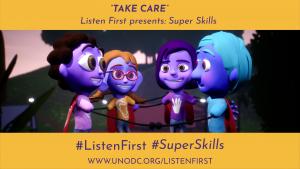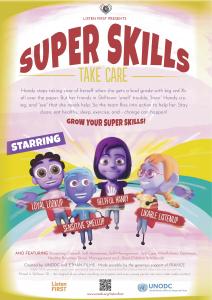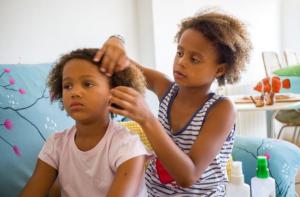Science proves that social and emotional skill development prevents violence and drug use, says UNODC
Social and emotional skill development in young children prevents substance use and fulfills human rights, says United Nations Office on Drugs and Crime.
Elizabeth Mattfeld, a UNODC programme coordinator, explains:
"For primary age children, one of the most effective and evidence-based strategies in drug use prevention is building social and emotional skills such as communication, decision making, self-management, and stress management. Learning these skills helps people to grow healthy, to stay positive. It also prevents violence and bullying, and many other risky behaviors. "
The achievement of fundamental human rights as declared in the Universal Declaration of Human Rights (UDHR), such as the right to education, health, and the principle of equality requires addressing and solving deep-rooted forms of discrimination that affect the most vulnerable. And inequalities – as are substance use prevention measures- are best addressed at an early stage.
"Children who live in vulnerable circumstances, lacking a support system and opportunities to grow their social and emotional skills have poorer mental and physical health and are more likely to engage in unproductive, risky behavior, including substance use. On the other hand, healthy, happy children perform better in school and are likely growing up to become healthy, productive adults who contribute more positively to their communities. So an investment in evidence-based methods such as skill development is actually an investment in building healthy, productive societies that respect and fulfill human rights in the longer perspective", concludes Elizabeth Mattfeld.
Investment in social and emotional skill development increases the overall mental and physical health, school performance, and later work satisfaction and success among the adults. Recently, major research by the McKinsey Global Institute lists "self-awareness" and "self-management" as two key skills that will help future employees thrive: https://www.mckinsey.com/industries/public-and-social-sector/our-insights/defining-the-skills-citizens-will-need-in-the-future-world-of-work
UNODC partners with human rights organizations around the world to promote a message of equality and inclusivity. Team Humanity Inc and its subsidiary Touchdown for Humanity partner locally and globally to address human rights, strengthen human relations, promote equity, bolster inclusivity and foster a sense of belonging across and within cultures and generations. Through its collaborations with UNODC’s ‘Listen First’ Initiative, Team Humanity is focused on youth and holistic wellness. The team provides consulting resources, and avenues to build supportive networks and culturally sensitive, collaborative programs for resilient, sustainable life skills to optimize each person’s unique, innate talents. This is particularly done via social-emotional learning and strengthening a sense of purpose, connectedness, and empowerment to thrive.
“There has never been a greater need, and there has never been a better time than now to equip youth in social and emotional skill development, particularly due to the unprecedented challenges faced in the wake of the global pandemic. While youth are most vulnerable in times of crisis, they are poised and capable of developing positive skills to offset potentially self-destructive behaviors such as drug use. As such, we are thrilled to continue our work with UNODC and the ‘Listen First’ materials. The focus on science and the development of social skills aligns with our vision to cultivate each person’s unique and innate character while nurturing abilities that empower and build resiliency to adversity, ultimately to best equip them for optimal quality of life,” says Dr. Barbara Hastie, Co-Founder of Team Humanity Inc & Touchdown for Humanity.
To celebrate this year's International Human Rights Day, the UN agency and its drug use prevention branch released a new video and educational materials under its latest 'Listen First' project 'Super Skills – The Science of Skills.'
'Super Skills: The Science of Skills' emphasizes social and emotional skill development in substance use prevention and targets primary age children and those working with them, including educators, health and prevention professionals, and policymakers.
The ‘Listen First’ initiative focus on science-based substance use prevention that puts listening to children and youth in focus. The program has been adopted nationally in Lithuania, Serbia, Slovenia, Poland, the United Arab Emirates, Latin America, Finland, and more.
The latest phase, 'Super Skills' was launched on World Children's Day, with its second video ''Take Care'' being released around International Human Rights Day, December 10th. In this film, "Helpful Handy" one of the key characters stops taking care of herself, but her Super Team friends in Skilltown fly into action to help her. The core message is about the importance of taking care of oneself and following routines - staying clean, eating healthy, sleeping, exercising, and change can happen!
Endorsed by international partners, such as Team Humanity, the National Institute on Drug Abuse (NIDA), and the International Society of Substance Use Professionals (ISSUP), the materials are available for educators, parents, teachers, policymakers, health workers, prevention workers, and the wider public.
'Listen First' materials are available in English, Spanish, and French on the 'Listen First' website, with guidance on local adaptations.
The rigorous science behind this program is summarized in the UNODC/WHO International Standards on Drug Use Prevention.
Elizabeth Mattfeld
UNODC
+43 699 14598752
email us here
Visit us on social media:
Facebook
Twitter
LinkedIn
Other
Take Care
Legal Disclaimer:
EIN Presswire provides this news content "as is" without warranty of any kind. We do not accept any responsibility or liability for the accuracy, content, images, videos, licenses, completeness, legality, or reliability of the information contained in this article. If you have any complaints or copyright issues related to this article, kindly contact the author above.



